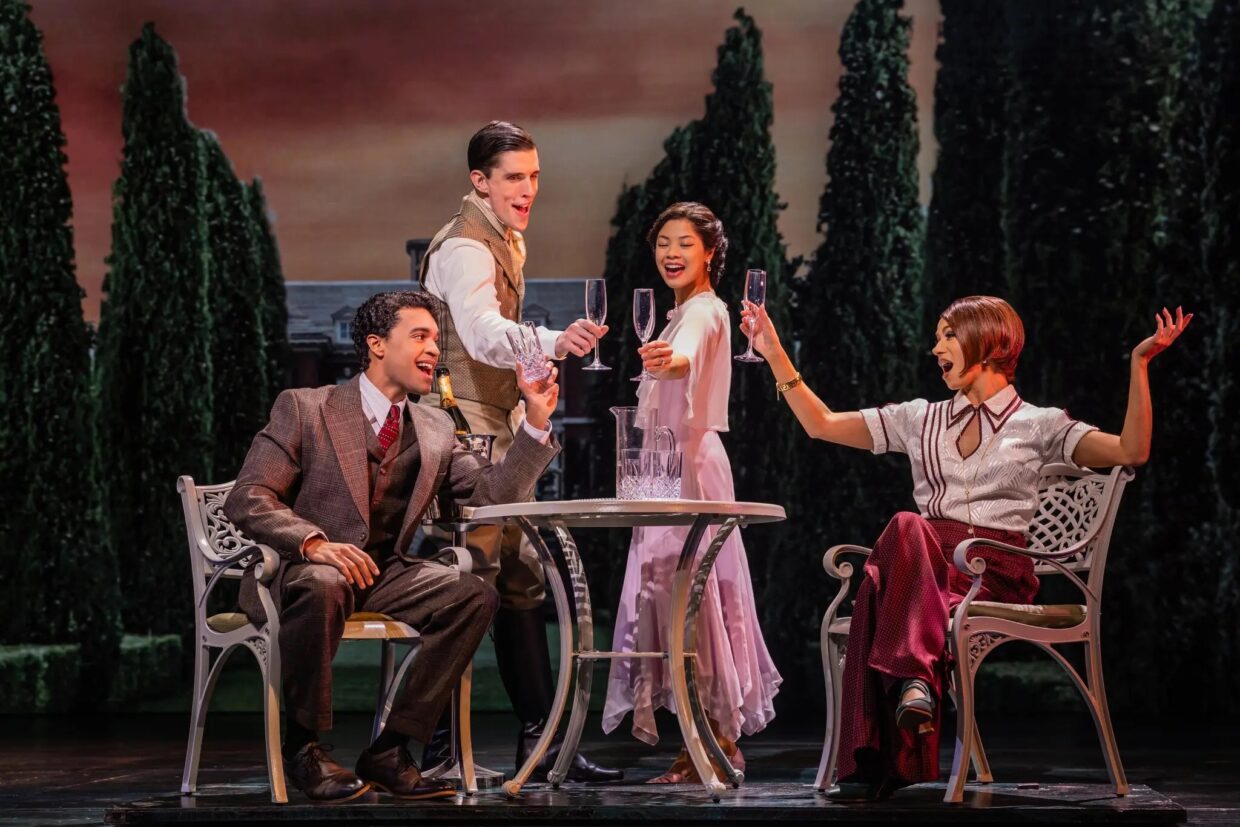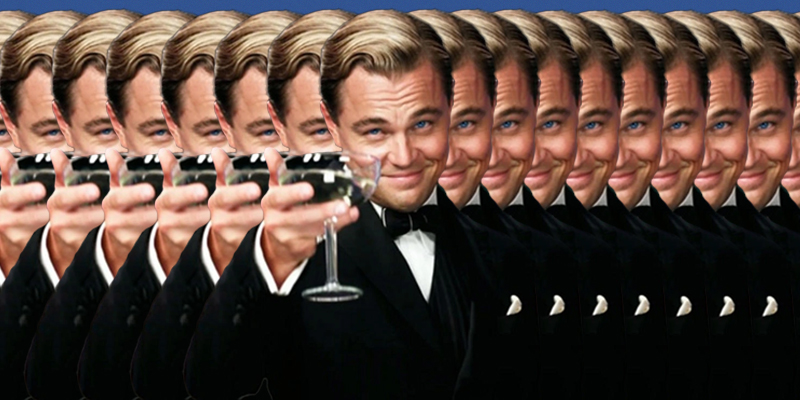An abridged timeline of Gatsby adaptations.
Oh, Jay Gatsby. That rascal of yore, that West Egg striver. His story has haunted the Great American canon for just-about-a hundred years. And Fitzgerald’s classic seems, to me, to be in its own class when it comes to spawning dramatic adaptations.
By my count, there are at least six Gatsby movies, two plays, and an opera. And this week, out of town trials began for the second Broadway-bound Gatsby musical…this season alone. While Hamlet laps this record by a lot, it’s nothing to shake a stick at, given that this novel’s only been around for a century. But what is it that makes Gatsby such a sticky property? Or maybe the question is: how did this unending party start, exactly? And when?
1926
The first theatrical Gatsby adaptation was written by Owen Davis, and directed by none other than the great George Cukor. This Gatsby ran at the Ambassador Theatre in New York for a skinny 112 performances in the spring of 1926, less than a year after the novel was published.
 Scene from the original stage production of The Great Gatsby.
Scene from the original stage production of The Great Gatsby.
In a review tracing Gatsby’s theatrical history, Rebecca Mead dismissed the original playwright, Davis, as “a prolific author of crowd-pleasing melodramas.” But despite its featherweight reputation, the play opened to some fine reviews and enjoyed a successful national tour. In a rare rave for the New York Evening Graphic, the gossip columnist Walter Winchell praised the “genuine, true-to-life characters.” Which is really an odd claim, however you spin it.
But this brings us to:
…1926
The first Gatsby film adaptation hit screens the same year. (Though technically lost to time, you can still peep a preview, here.) This silent sixty minute feature from the Irish auteur Herbert Brenon was adapted from the play script, and it apparently set a precedent for emphasizing the novel’s glamorous set-pieces over the finer points of its critique. (Note the Esther Williams-evoking poolside scene, with its dozens of feather-festooned extras.)
Now fast forward to…
1949

The first filmic reboot.
In his Times review, Bosley Crowther (real name, italics mine) claimed this version of the story put “particular emphasis upon the aspects of the sentimental romance” at the novel’s center. Crowther also threw shade, calling out this Great Gatsby‘s “weak script,” and “artificial…stiff” acting. He even wondered if the head honchos at Paramount had “selected this old tale primarily as a standard conveyance for the image of its charm boy, Alan Ladd.”
Like its predecessor, this film enjoyed a lukewarm reception. It was never syndicated for television, and wasn’t re-released until 2012. Some of this might be attributed to timing—this was the only Gatsby to be made under the rein of the draconian Hays code, so the story’s “immoral” elements may have been softened to dulling effect.
Though reviews from Letterbox, the people’s code, suggest other failings.
1974
Now we cut to the 70s, but the kids stay in the picture. Francis Ford Coppola wrote the screenplay for this much-hyped adaptation, which the critic Vincent Canby famously called “lifeless as a body that’s been too long at the bottom of a swimming pool.”
Though cemented in film history as a spectacular flop, Vanity Fair notes one great reason to revisit this classic: “the genuinely gorgeous costumes, designed by Theoni V. Aldredge (who won an Oscar), with assistance from then tyro Ralph Lauren.” (Italics mine, again.)
 Mia Farrow as Daisy.
Mia Farrow as Daisy.
And I personally have a hard time condemning Robert Redford, even if he did play the millionaire as a bit too much of a cipher.
2000
In which the Empire, i.e. the critical press, strikes back. This British-helmed made-for-tv adaptation had a bizarre but enticing cast (Paul Rudd + Mira Sorvino?!)—but almost nobody seemed to like it. The Guardian was particularly snide, calling the project “glib…shallow…[and] uninspired.”
2000
At the dawn of the millennium, we also got Gatsby the opera, which premiered at the Metropolitan Opera. The score was elegant, but some critics felt the book dragged. Ironic, considering the compact length of its source material.
2002
This loosest-on-the-list adaptation, G, placed Gatsby avatars among the Black elite. Set in an early-aughts Hamptons, Christopher Scott Cherot’s movie enjoyed a “fitful” relationship to its inspiration. (Gatsby here is called ‘Summer G,’ and a young Blair Underwood plays the antagonist, Chip Hightower.)
 Promo poster for G (2002).
Promo poster for G (2002).
Though we must give props to anyone making a stab at a real interpretation, Roger Ebert felt this film’s most interesting elements suffered by contrast to the novel.
2010
At this point in the story—after a lengthy, tedious petition for rights—the board-treaders get fully back in, thanks to an intrepid experimental theatre company: Elevator Repair Service. ERS’ eight hour stage adaptation, Gatz, enlisted every line of the novel verbatim. And this “most compelling” piece is my personal favorite on this list. In addition to honoring the (every) letter of the novel, this one captures the spirit of the book, too. The whimsy and doom feel perfectly balanced, and despite the duration it’s a truly engaging piece.
Hot tip, tristate area: Gatz will be returning to The Public Theater for a limited engagement this fall. So make like Dr. T.J. Eckleberg and keep your eyes peeled for tickets.
2013
You’ll know this film from the poster. Or the airplane, where you watched it on a cross-country flight. Baz Luhrmann’s “orgiastic” adaptation took some anachronistic liberties with the source material (see: Jay-Z soundtrack). But it was exhaustively researched, celebratory camp.
2023
 Gatsby at the Paper Mill Playhouse, 2023.
Gatsby at the Paper Mill Playhouse, 2023.
This splashy musical, composed by Jason Howland and Nathan Tysen with a book by Kait Kerrigan, premiered at the Paper Mill Playhouse a little less than two years after The Great Gatsby entered the public domain. Now it’s on Broadway starring modern “charm boy” Jeremy Jordan.
Though the critical reception for this one is pretty uninspired, by all accounts this is a fun night on the town true to established filmic pattern. Viewers can expect big set-pieces, Jazz Age couture, and scarce gloom and doom.
2024
The story doesn’t end here, but it’s where we’ll get off. Though it didn’t win the race to Broadway, this latest Gatsby musical has the benefit of an audacious, agenda-teasing subtitle—Gatsby: An American Myth. The team behind it is also very exciting. Pulitzer-Prize-winning playwright Martyna Majok wrote the book, Tony-winning Rachel Chavkin is directing, and the music is by rock stars Thomas Bartlett and Florence (of Florence + the Machine).
Most compelling, though? Chavkin and Majok have apparently tried to honor the gloom that so many of the adaptations above prefer to skirt. According to The Boston Globe, Majok’s script “aims to capture Fitzgerald’s ambivalence about the American Dream” and the ways “we ruin ourselves in the pursuit of it.”
I will hold my breath. Could this be a new sport?





